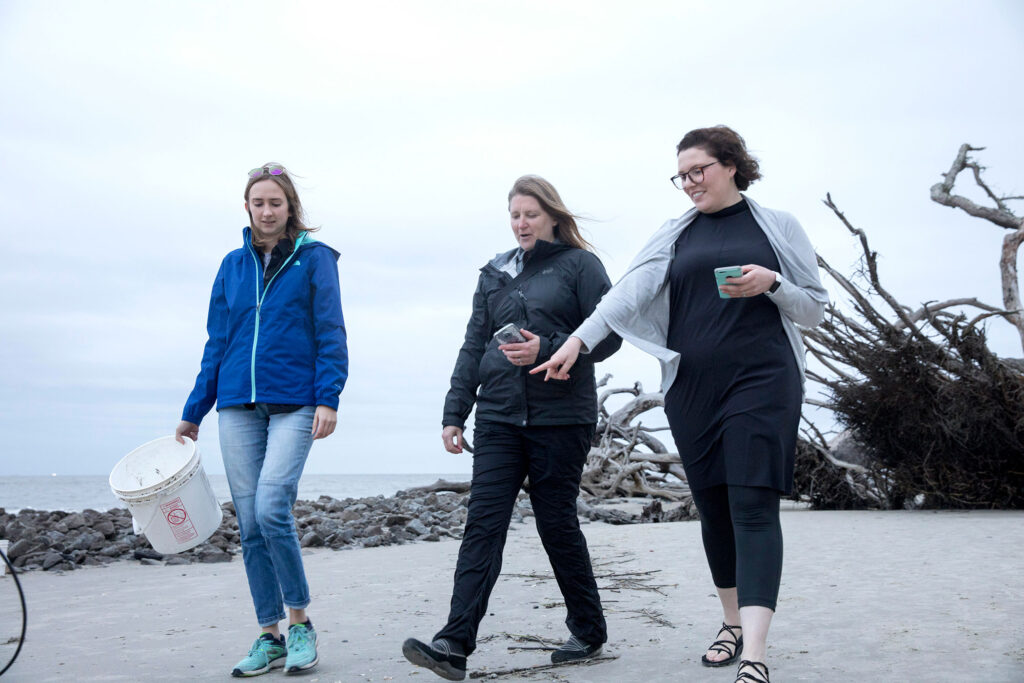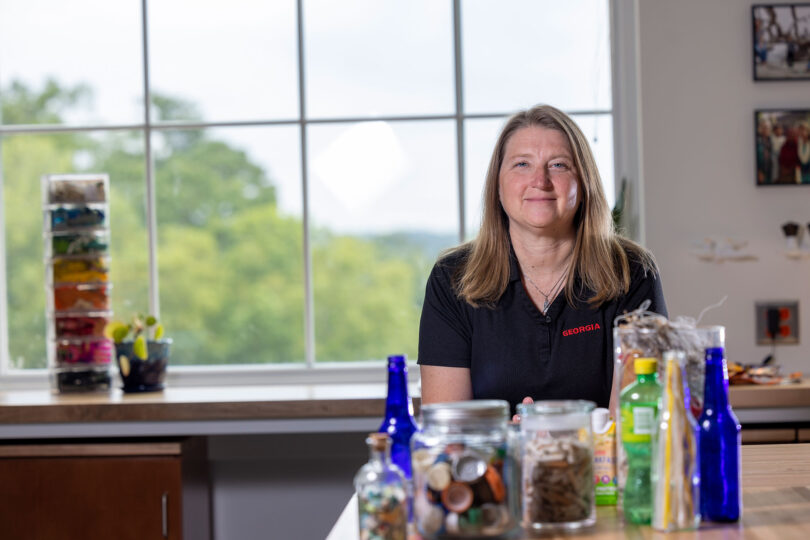Jenna Jambeck, Georgia Athletic Association Distinguished Professor of Environmental Engineering at the University of Georgia, was named the 2024 SEC Professor of the Year on Thursday for her decades of work investigating the global scale of plastic pollution and galvanizing efforts to address solid waste and marine debris.
The award is given annually to one SEC faculty member whose record of teaching and research places him or her among the elite in higher education. Winners are selected by the SEC provosts from among the 14 SEC Faculty Achievement Award recipients.
“The University of Georgia is extremely proud of Dr. Jambeck not only for providing a better understanding of one of the world’s most pressing challenges but also for translating her research into workable solutions that will benefit all of society,” said President Jere W. Morehead. “I am grateful to the Southeastern Conference for recognizing her global impact with this distinguished and well-deserved award.”
Jambeck, who is also a Regents’ Professor of Environmental Engineering in UGA’s College of Engineering, founded the Circularity Informatics Lab in UGA’s New Materials Institute and serves as a National Geographic Explorer.
A renowned expert in a field that did not even exist 20 years ago, Jambeck has garnered more than $6 million in research grants, with collaborators around the globe.
Her work is supported by a diverse set of entities, including the United Nations, the World Bank, U.S. government agencies, foundations (both U.S. and international), nongovernmental organizations and the private sector. Jambeck has conducted public environmental diplomacy as an International Informational Speaker for the U.S. Department of State since 2017.
“The global impact of Dr. Jambeck’s research and her dedication to empowering communities through citizen science are remarkable,” said S. Jack Hu, UGA’s senior vice president for academic affairs and provost. “Her commitment to the next generation as a teacher and mentor truly sets her apart.”
Jambeck’s research provides a glimpse into how plastic waste is affecting environments
Jambeck’s seminal 2015 study published in Science provided the first estimate of the amount of plastic waste entering the ocean each year: a staggering 8 million metric tons.
In a follow-up study, Jambeck and her team discovered that humans had generated 8.3 billion metric tons of plastic since the large-scale production of synthetic materials began in the early 1950s. Of that waste, the researchers found 79% wound up in landfills or in the environment.
A finding from Jambeck’s research was named the International Statistic of the Year in 2018 by the Royal Statistical Society. In that study, Jambeck and her colleagues found that more than 90% of plastic has never been recycled. The statistic lent a sense of scale to the problem of global plastic pollution.
Jambeck also co-developed the Marine Debris Tracker mobile app with associate professor Kyle Johnsen of the UGA College of Engineering. The mobile app, created in partnership with the National Oceanic and Atmospheric Administration (NOAA), provides a platform for community members to inform research efforts by logging the types and quantities of plastic debris in their communities.
In 2022, Jambeck was awarded a coveted “Genius Grant” from the John D. and Catherine T. MacArthur Foundation. MacArthur Fellowships are among the most prestigious awards in the United States. Fellows are nominated by a select pool of experts and leaders in the arts, sciences, humanities and other areas for their extraordinary originality and dedication in their creative pursuits for the benefit of society.
Jambeck is the third UGA faculty member in the last 12 years to receive the award. In 2012, Loch Johnson was selected for the honor. Marshall Shepherd was the 2022 recipient.
“Our college is proud to have Dr. Jambeck recognized by our peers in the SEC,” said Donald J. Leo, dean of UGA’s College of Engineering and UGA Foundation Professor in Engineering. “This honor is another recognition of the significant impact that her research and scholarship are making around the world.”

(From left) Emily Roberts, Jenna Jambeck and Jennie Mathis-Alexander collect litter debris on Jekyll Island’s Driftwood Beach. (Photo by Dorothy Kozlowski)
Advocating for change in plastic production on a global scale
In 2019, Jambeck co-led an interdisciplinary team that gathered the first empirical baseline data on plastic pollution along 1,600 miles of the Ganges River system. She undertook a similar project along the Mississippi River in 2021.
In 2020, Jambeck collaborated on a publication in Science Advances demonstrating that the U.S. generated the largest amount of plastic waste of any country in the world, with some of it being littered, illegally dumped in the states or inadequately managed in countries that import materials collected in the U.S. for recycling.
She was then invited to serve on a consensus study committee of the National Academies of Sciences, Engineering and Medicine to document U.S. contributions to global ocean plastic waste and was appointed to the inaugural board of the NOAA Marine Debris Foundation.
Reducing plastic pollution requires complex, systems-level change, and Jambeck is committed to translating scientific evidence into policy solutions.
Jambeck and her colleagues developed the Circularity Assessment Protocol—a cost-effective toolkit for assessing materials management systems at the community level—to help people understand how plastic is used and flows through their communities through waste management and leakage into the environment. The system has helped community members in more than 51 cities around the world work with plastic manufacturers and people whose livelihoods depend on waste management to implement solutions to reduce plastic waste.








